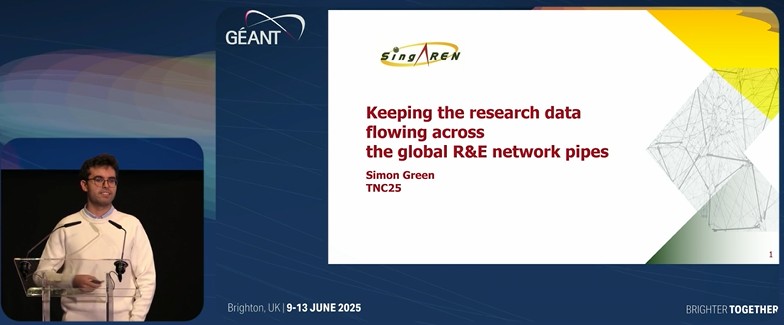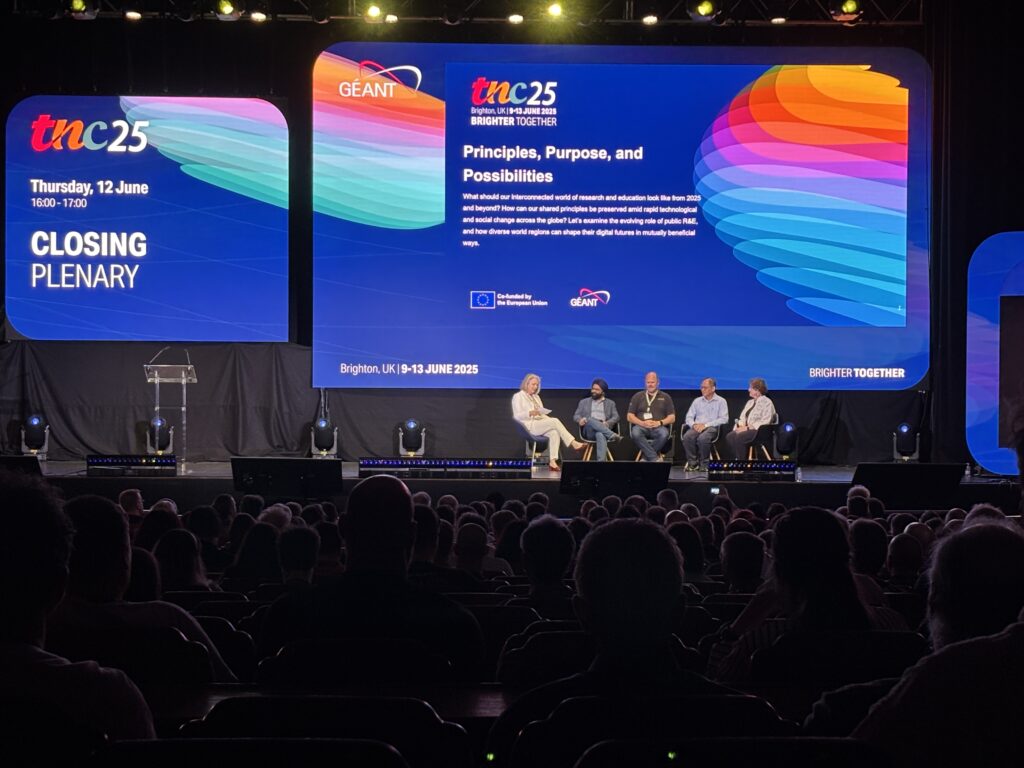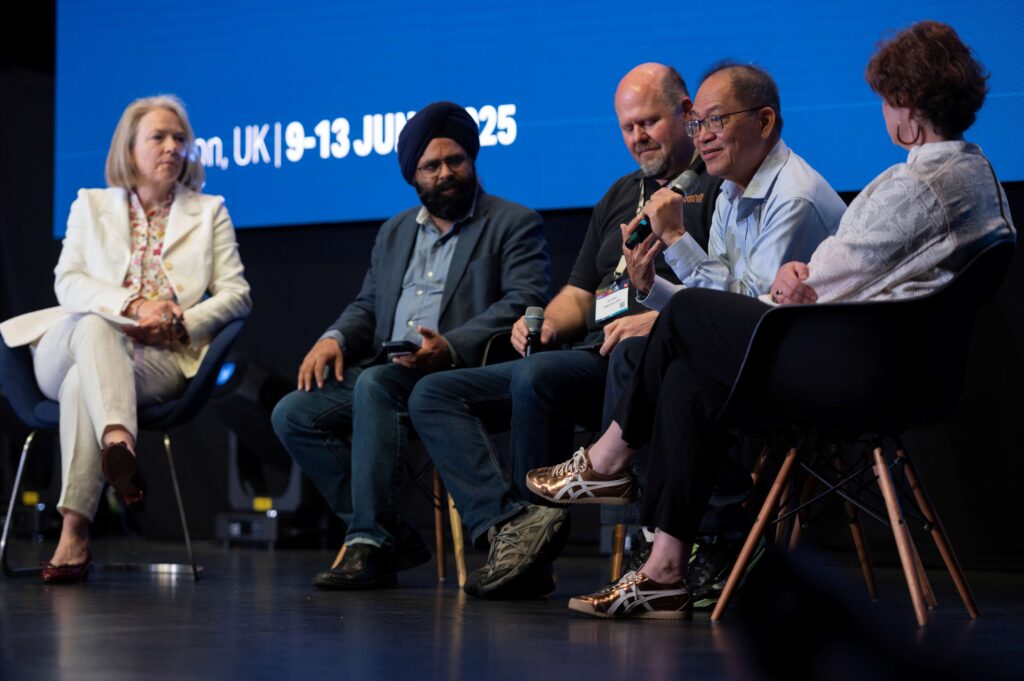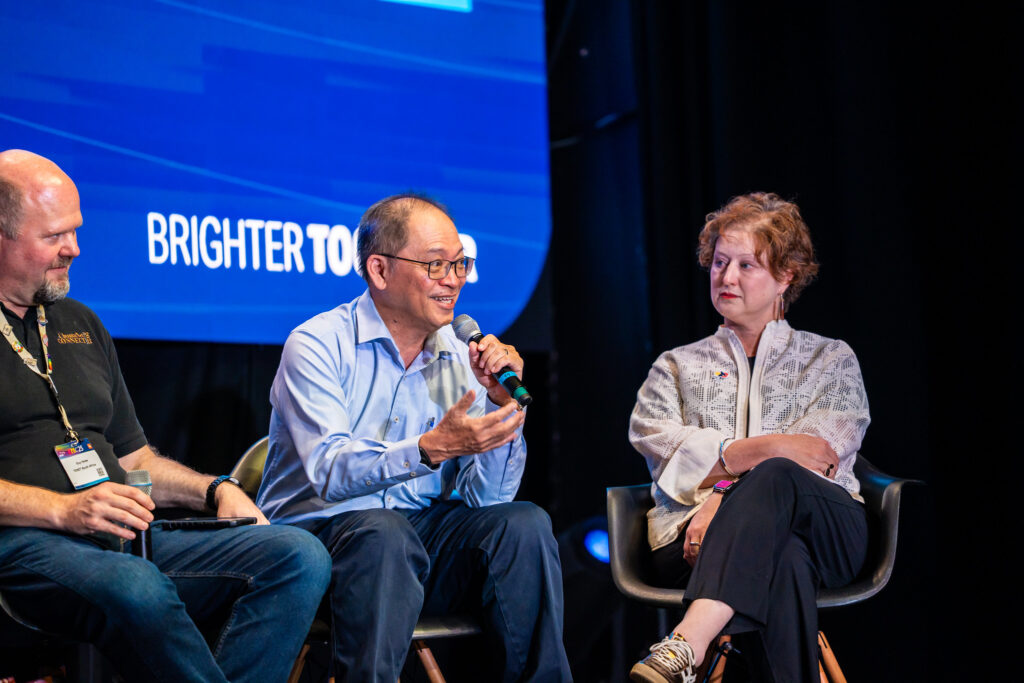Keeping the Research Data Flowing: SingAREN at TNC25
24 Jun 2025 – At the recent TNC25 conference held at Brighton, UK 9 – 13 June 2025, SingAREN’s Technical Manager Simon Green delivered a powerful overview of how the Global Research and Education Network (GREN) is evolving to support science at a planetary scale. His talk – “Keeping the Research Data Flowing Across the Global R&E Network Pipes”, highlighted the infrastructure, partnerships, and resilience that underpin today’s data-intensive research collaborations.

Figure 1 Simon Green opening presentation during the Global Connectivity track on 10 Jun 2025 TNC25 conference – Photo courtesy of TNC25 organisers
Simon described the GREN as a robust ecosystem of terrestrial and submarine networks, enabled by close cooperation between national research and education networks (NRENs) worldwide. Key systems such as the Asia-Pacific Europe Ring (AER), APOnet, the North Atlantic (ANA) collaboration, and the Americas-Africa Lightpaths (AmLight) project have scaled to deliver multi-terabit global capacity.
He spotlighted real-world applications that rely on this connectivity: from the CERN Large Hadron Collider (LHC) and upcoming Square Kilometre Array (SKA) telescopes, to cutting-edge remote robotic surgeries trial between Singapore and Japan. Competitions like the Data Mover Challenge further push innovation by testing the network’s capacity to transfer massive data volumes efficiently. These examples demonstrated how global research data flows seamlessly across multiple continents—often invisibly—thanks to decades of technical collaboration and trust.
Simon also shared how GREN’s resilience was stress-tested in 2024 when multiple cable breaks occurred simultaneously. Despite these major outages, research traffic remained uninterrupted thanks to diverse routing and failover mechanisms designed into the network. The Singapore-Japan backbone, jointly operated by SingAREN and partners like SINET and JGN, was showcased as a prime example of such built-in resilience.
Closing his talk, Simon underscored the critical need to future-proof infrastructure in light of growing data demands—from the high-luminosity LHC upgrade to next-generation scientific instruments. His message was clear: “Resiliency, global collaborations, and enabling science” must remain at the heart of R&E networking efforts.
In the TNC25 Closing Plenary, moderator Lisa Fuhr (GÉANT) facilitated a thought-provoking panel with NREN leaders from across the globe—Inder Monga (ESnet), Guy Halse (South African TENET), Francis Lee (SingAREN), and Amber McEwan (REANNZ) —to explore how the global research and education (R&E) community can thrive amid rising geopolitical fragmentation and rapid digital transformation.

Figure 2 Closing Plenary at TNC25 on 12 Jun 2025

Figure 3 Close-up, from left: moderator Lise Fuhr (GÉANT), Inder Monga (ESnet), Guy Halse (TENET South Africa), Francis Lee (SingAREN) and Amber McEwen (REANNZ Ltd) – Photo courtesy of TNC25 organisers
The panel emphasised the power of the global R&E ecosystem: not only in maintaining resilient infrastructure, but also in strengthening human networks and shared values. Discussions ranged from digital sovereignty and ethical collaborations with commercial providers, to bridging disparities in education and leveraging AI responsibly.
SingAREN vice-president, Francis Lee, shared reflections from Singapore and his experience working with both developed and developing nations across Asia. He highlighted how global collaboration—both technical and human—is essential to overcome fragmentation. Citing the Asia-Europe Ring (AER) project, he explained how coordinated efforts among 11 partners created resilient intercontinental connectivity, far more cost-effectively than going it alone. He also recounted how support from Nordunet during the COVID-19 pandemic helped underserved countries like Sri Lanka and Bangladesh gain critical access to education platforms like Zoom, reinforcing the role of NRENs in bridging digital divides. Francis also addressed the evolving education landscape, noting how AI should be embraced in teaching. He encourages students to use AI tools ethically and transparently, equipping them for the future rather than resisting technological change.

Figure 4 Francis Lee sharing his thoughts during the panel session – Photo courtesy of TNC25 organisers
The panel concluded with a call to action: to keep communicating, collaborating, and supporting one another. As Amber McEwan put it, “don’t give up at the first hurdle.” And with Inder Monga’s reading of a poem from Rabindranath Tagore’s “Where the Mind is Without Fear”, the community was reminded of its shared mission to enable education and research without borders.
SingAREN is proud to be part of this global network community, working hand-in-hand with international partners to keep research data flowing, wherever discovery leads.


